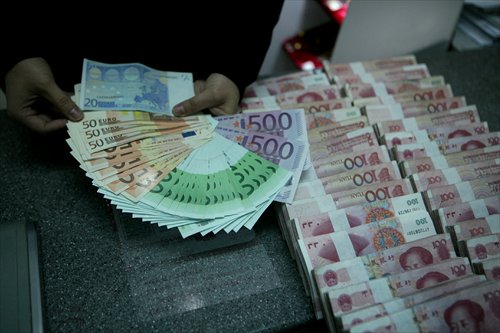China lifts $1b QFII quota ceiling
Country will remain vigilant about risks: SAFE

An employee counts euros at a bank in Yichang, Central China's Hubei Province on Wednesday. Photo: CFP
China on Thursday lifted the $1 billion investment quota limit for overseas fund management companies, as part of the effort to further open up the country's capital market and pursue structural reforms amid a "new normal" of slower growth.
Fidelity Investment Management (Hong Kong) Ltd was granted a quota of $1.2 billion for investment in the Chinese mainland's domestic capital market under the qualified foreign institutional investor (QFII) program, according to the latest update on QFII quota awards released by the State Administration of Foreign Exchange (SAFE) Thursday.
The amount is higher than the level of $1 billion, at which QFII quotas have been capped since 2009.
Previously only a handful of sovereign wealth funds, central banks and monetary authorities were allowed to invest more than $1 billion under the QFII program.
SAFE did not specifically announce that a decision had been made to lift or remove the quota ceiling. Fidelity Investments could not be reached for comment.
But at a press briefing on Thursday, shortly before the posting of the latest update on QFII awards, Guo Song, director of SAFE's capital account management department, said that China was considering raising the $1 billion QFII quota and would soon release data to indicate such a raise.
"The relaxation of the QFII quota marks further liberalization of China's capital market. Little risk will be involved, because QFII programs have been implemented for years and investors included in the programs are mature and prudent," Dong Dengxin, director of the Financial Securities Institute at Wuhan University of Science and Technology, told the Global Times on Thursday.
Launched in 2003, the QFII program is the main channel for overseas financial institutions to invest in China's capital markets under a given quota.
"Reform of the QFII program could introduce more overseas investors to China's capital markets, help improve the markets' ecology and improve the investment structure of the domestic capital markets," Dong said.
However, Guo said it would take time for China to reform its QFII mechanism, adding that the country has not yet decided to replace the approval-based system for quotas with a registration-based one.
According to a report by Reuters Wednesday, China will adopt a registration system that eliminates the need to apply for regulatory approval for quotas in the interbank market.
Reforming the QFII scheme is part of China's plan to liberalize the country's capital market and open its capital account to help push the yuan to be included in the IMF's Special Drawing Rights (SDRs) - international foreign exchange reserve assets. The IMF is set to hold its five-year SDR review later this year.
Currently, the capital account - which includes foreign indirect investment, portfolio investments, the reserve account and other investments - is still controlled by China's authorities due to concerns about abrupt capital flows moving in and out of the country.
Zhou Xiaochuan, the central bank governor, said Sunday that China will launch a series of policies and pilot programs to reform the QFII scheme in 2015, and move to make the yuan basically convertible.
China has the last kilometer to go before it makes the yuan fully convertible under the capital account, Wang Yungui, head of SAFE's policy and rules department, said at the same press conference Thursday.
While focusing on reforms, China will also prevent risk and assess the possible impact of capital inflows and outflows after the yuan becomes fully convertible, Wang said.
"Under the current international climate - in which most economies are vigilant about capital flows and the yuan's exchange rate formation mechanism has not yet been sufficiently improved - it will still take a few years for the country to fully open its capital account," Zhang Bin, director of the Global Macroeconomy Research Division under the Chinese Academy of Social Sciences, told the Global Times on Thursday.